#automation in devops
Explore tagged Tumblr posts
Text
Unlocking the Power of DevOps on Azure: A Comprehensive Guide
In today's rapidly evolving technological landscape, the adoption of DevOps practices has become imperative for organizations striving to deliver high-quality software at a faster pace. Microsoft Azure, with its robust suite of cloud services, provides an ideal platform for implementing and maximizing the benefits of DevOps. This comprehensive guide will walk you through the key components, best practices, and tools available on Azure to unlock the full potential of DevOps.
Azure Overview
Azure is Microsoft's cloud computing platform, providing a wide range of services to help organizations build, deploy, and manage applications. When combined with DevOps practices, Azure becomes a powerful tool for achieving continuous integration and continuous delivery (CI/CD)."In the world of continuous improvement, DevOps training in Hyderabad is the compass that guides your team towards efficiency and innovation."
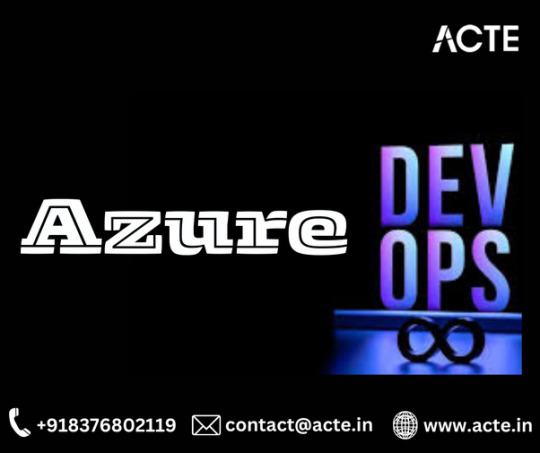
Integration with DevOps
Azure seamlessly integrates with popular DevOps tools and services, creating a robust ecosystem for application development. This integration ensures that development teams can leverage Azure's capabilities to streamline processes, automate tasks, and deliver software faster and more reliably.
Understanding DevOps on Azure
DevOps on Azure is a collaborative and streamlined approach to software development and IT operations, leveraging Microsoft's cloud computing platform, Azure. It combines the principles of DevOps with the robust features of Azure to enhance the entire development lifecycle.
1. Collaborative Development:
DevOps on Azure promotes collaboration between development and operations teams. It breaks down silos, fostering a culture where both teams work together seamlessly to achieve common goals.
2. Azure DevOps Services:
Azure offers a suite of tools known as Azure DevOps Services, covering version control, build automation, release management, and more. These services act as a central hub, providing a unified platform for efficient project planning, tracking, and execution.
3. Continuous Integration and Delivery (CI/CD):
Azure Pipelines, a key component, automates the build, test, and deployment processes, enabling teams to achieve continuous integration and continuous delivery. This results in faster and more reliable software releases.
4. Version Control with Azure Repos:
Azure Repos, integrated with Azure DevOps, provides robust version control supporting Git and TFVC. It ensures effective source code management and collaboration, crucial for a smooth development workflow.
5. Project Management with Azure Boards:
Azure Boards facilitates agile project management, allowing teams to plan sprints, track work progress, and manage backlogs. This ensures visibility and transparency throughout the development cycle.
"Break free from limitations. Our DevOps online course empowers you to upscale your skills, all from the comfort of your home."
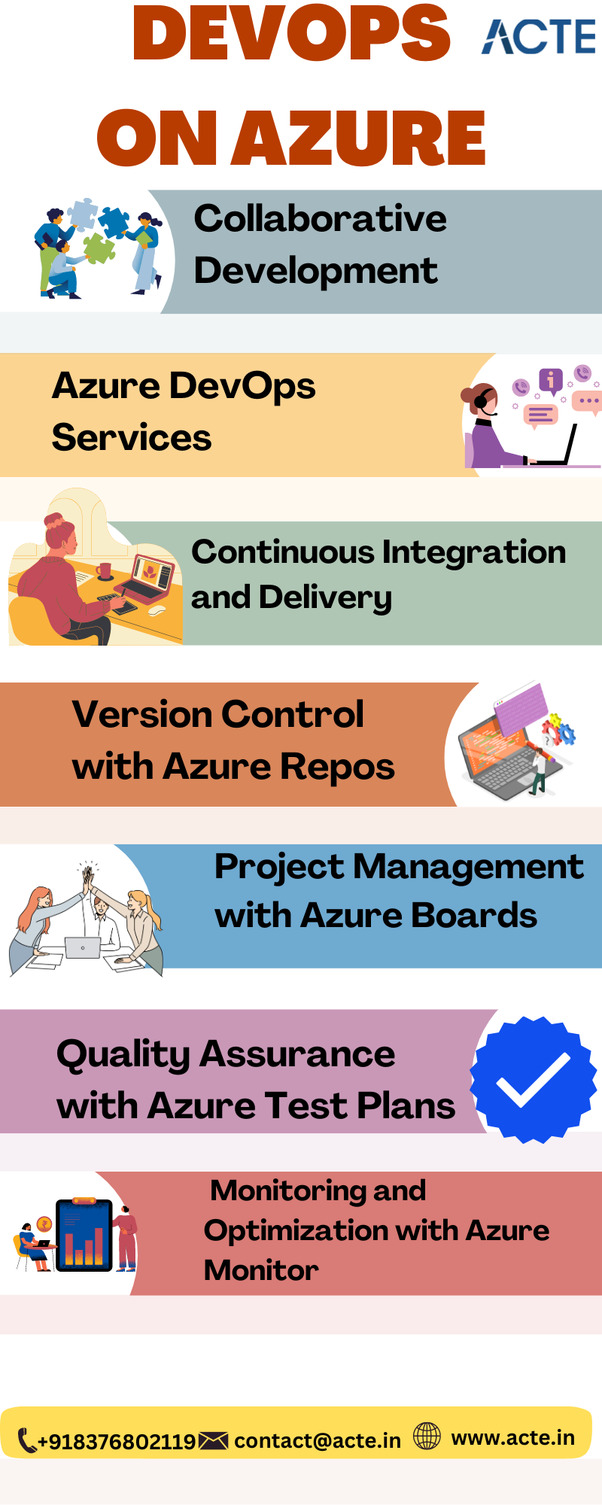
6. Quality Assurance with Azure Test Plans:
DevOps on Azure includes Azure Test Plans, a testing tool that assists teams in planning, tracking, and managing testing efforts. This ensures the quality and reliability of applications before deployment.
7. Monitoring and Optimization with Azure Monitor:
Azure Monitor provides comprehensive insights into the performance and health of applications and infrastructure. This monitoring solution allows proactive identification and resolution of issues, contributing to a more stable and reliable system.
Summarize the key takeaways from the guide, emphasizing the seamless integration of DevOps practices on Microsoft Azure. Encourage organizations to leverage the powerful combination of Azure's cloud services and DevOps principles to enhance agility, collaboration, and overall software delivery capabilities.
0 notes
Text
Explore the dynamic fusion of DevOps & Machine Learning, unraveling how ML redefines operational paradigms. Dive into the future of tech efficiency
#Automation in DevOps#ML Algorithms for DevOps#Machine Learning in Operations#DevOps Transformation with ML#ML-enhanced Efficiency#Integration of ML in DevOps#ML-Enabled DevOps Practices#DevOps Automation
0 notes
Text
The Agile Leader's Playbook: Mastering DevOps
In today’s high-speed digital world, Agile methodologies have transformed the way organizations deliver software. They emphasize collaboration, flexibility, and customer satisfaction. Yet, to truly excel in this dynamic landscape, Agile leaders need to embrace a powerful ally: DevOps. In this guide, we’ll delve into the perfect synergy between Agile and DevOps, offering a clear, concise roadmap…
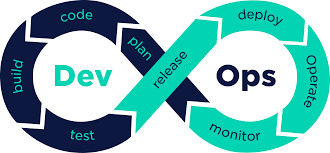
View On WordPress
0 notes
Text
🚀 Introducing STRUCT: Automated Project Structure Generator!
Organize your projects effortlessly with Struct. From CI/CD pipelines to Docker setups, Struct ensures your repo follows best practices.
🔗 Check it out on GitHub and start contributing today! No one needs to know this, but it was build from ground up with ChatGPT-4o
11 notes
·
View notes
Text
DevOps as Service
2. PROCESS IMPLEMENTATION
We proceed with the analysis, design, building, automation, and implementation in the specified areas.
2 notes
·
View notes
Text
youtube
The Best DevOps Development Team in India | Boost Your Business with Connect Infosoft
Please Like, Share, Subscribe, and Comment to us.
Our experts are pros at making DevOps work seamlessly for businesses big and small. From making things run smoother to saving time with automation, we've got the skills you need. Ready to level up your business?
#connectinfosofttechnologies#connectinfosoft#DevOps#DevOpsDevelopment#DevOpsService#DevOpsTeam#DevOpsSolutions#DevOpsCompany#DevOpsDeveloper#CloudComputing#CloudService#AgileDevOps#ContinuousIntegration#ContinuousDelivery#InfrastructureAsCode#Automation#Containerization#Microservices#CICD#DevSecOps#CloudNative#Kubernetes#Docker#AWS#Azure#GoogleCloud#Serverless#ITOps#TechOps#SoftwareDevelopment
2 notes
·
View notes
Text
Azure’s Evolution: What Every IT Pro Should Know About Microsoft’s Cloud
IT professionals need to keep ahead of the curve in the ever changing world of technology today. The cloud has become an integral part of modern IT infrastructure, and one of the leading players in this domain is Microsoft Azure. Azure’s evolution over the years has been nothing short of remarkable, making it essential for IT pros to understand its journey and keep pace with its innovations. In this blog, we’ll take you on a journey through Azure’s transformation, exploring its history, service portfolio, global reach, security measures, and much more. By the end of this article, you’ll have a comprehensive understanding of what every IT pro should know about Microsoft’s cloud platform.
Historical Overview
Azure’s Humble Beginnings
Microsoft Azure was officially launched in February 2010 as “Windows Azure.” It began as a platform-as-a-service (PaaS) offering primarily focused on providing Windows-based cloud services.
The Azure Branding Shift
In 2014, Microsoft rebranded Windows Azure to Microsoft Azure to reflect its broader support for various operating systems, programming languages, and frameworks. This rebranding marked a significant shift in Azure’s identity and capabilities.
Key Milestones
Over the years, Azure has achieved numerous milestones, including the introduction of Azure Virtual Machines, Azure App Service, and the Azure Marketplace. These milestones have expanded its capabilities and made it a go-to choice for businesses of all sizes.
Expanding Service Portfolio
Azure’s service portfolio has grown exponentially since its inception. Today, it offers a vast array of services catering to diverse needs:
Compute Services: Azure provides a range of options, from virtual machines (VMs) to serverless computing with Azure Functions.
Data Services: Azure offers data storage solutions like Azure SQL Database, Cosmos DB, and Azure Data Lake Storage.
AI and Machine Learning: With Azure Machine Learning and Cognitive Services, IT pros can harness the power of AI for their applications.
IoT Solutions: Azure IoT Hub and IoT Central simplify the development and management of IoT solutions.
Azure Regions and Global Reach
Azure boasts an extensive network of data centers spread across the globe. This global presence offers several advantages:
Scalability: IT pros can easily scale their applications by deploying resources in multiple regions.
Redundancy: Azure’s global datacenter presence ensures high availability and data redundancy.
Data Sovereignty: Choosing the right Azure region is crucial for data compliance and sovereignty.
Integration and Hybrid Solutions
Azure’s integration capabilities are a boon for businesses with hybrid cloud needs. Azure Arc, for instance, allows you to manage on-premises, multi-cloud, and edge environments through a unified interface. Azure’s compatibility with other cloud providers simplifies multi-cloud management.
Security and Compliance
Azure has made significant strides in security and compliance. It offers features like Azure Security Center, Azure Active Directory, and extensive compliance certifications. IT pros can leverage these tools to meet stringent security and regulatory requirements.
Azure Marketplace and Third-Party Offerings
Azure Marketplace is a treasure trove of third-party solutions that complement Azure services. IT pros can explore a wide range of offerings, from monitoring tools to cybersecurity solutions, to enhance their Azure deployments.
Azure DevOps and Automation
Automation is key to efficiently managing Azure resources. Azure DevOps services and tools facilitate continuous integration and continuous delivery (CI/CD), ensuring faster and more reliable application deployments.
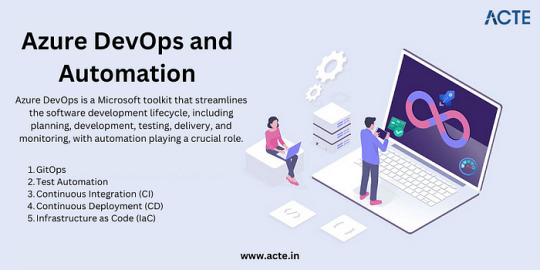
Monitoring and Management
Azure offers robust monitoring and management tools to help IT pros optimize resource usage, troubleshoot issues, and gain insights into their Azure deployments. Best practices for resource management can help reduce costs and improve performance.
Future Trends and Innovations
As the technology landscape continues to evolve, Azure remains at the forefront of innovation. Keep an eye on trends like edge computing and quantum computing, as Azure is likely to play a significant role in these domains.
Training and Certification
To excel in your IT career, consider pursuing Azure certifications. ACTE Institute offers a range of certifications, such as the Microsoft Azure course to validate your expertise in Azure technologies.

In conclusion, Azure’s evolution is a testament to Microsoft’s commitment to cloud innovation. As an IT professional, understanding Azure’s history, service offerings, global reach, security measures, and future trends is paramount. Azure’s versatility and comprehensive toolset make it a top choice for organizations worldwide. By staying informed and adapting to Azure’s evolving landscape, IT pros can remain at the forefront of cloud technology, delivering value to their organizations and clients in an ever-changing digital world. Embrace Azure’s evolution, and empower yourself for a successful future in the cloud.
#microsoft azure#tech#education#cloud services#azure devops#information technology#automation#innovation
2 notes
·
View notes
Text
CBDC technology partner India
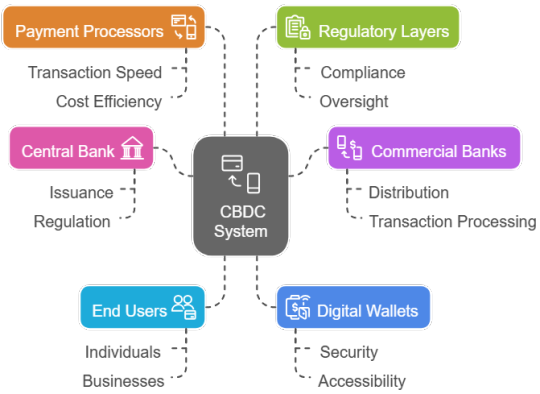
As CBDCs become a global reality, Prodevans equips banks with everything needed to enter the digital currency ecosystem. We provide full-spectrum CBDC implementation — including compliant architecture, token management, real-time reconciliation, secure wallet enablement, and 24/7 L1/L2 support. Trusted for our role in India’s national rollout, we help institutions go beyond pilots to scalable, production-ready platforms ensuring seamless end- user readiness. Our services ensure central bank compliance while delivering performance, observability, and rapid response to evolving regulatory needs. Whether you’re in the pilot phase or preparing for production rollout, Prodevans supports your CBDC journey at every step.
OUR ADDRESS
403, 4TH FLOOR, SAKET CALLIPOLIS, Rainbow Drive, Sarjapur Road, Varthurhobli East Taluk, Doddakannelli, Bengaluru Karnataka 560035
OUR CONTACTS
+91 97044 56015
#CBDC (Central Bank Digital Currency)#Cloud Computing & Cloud Services#Application Modernization#360° Monitoring (Server#Application#Database & Virtualization Monitoring)#Identity & Access Management (IAM)#Automation (incl. ML‑driven#Ansible#network/cloud automation)#DevOps Tools & Support#Infrastructure Management (IaaS/PaaS/SaaS#orchestration#orchestration tools)
0 notes
Text
Unveiling the Inner Workings of DevOps
DevOps, short for Development and Operations, is a revolutionary approach that has reshaped the landscape of software development and IT operations. In this blog post, we will delve into the core concepts, principles, and practices that constitute the inner workings of DevOps. By understanding the essence of DevOps, organizations can foster collaboration, streamline workflows, and accelerate the delivery of high-quality software.
"DevOps training in Hyderabad: Transforming silos into bridges for enhanced communication and collaboration."
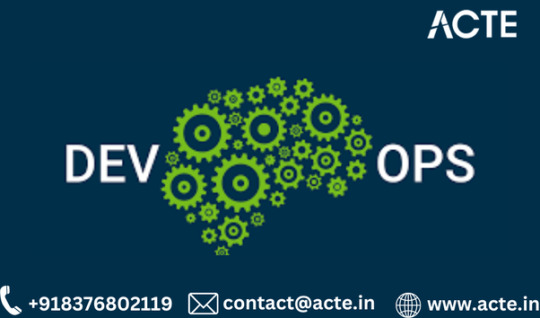
How Does DevOps Work?
DevOps is like the conductor of an orchestra, ensuring all the different elements in software development play together harmoniously. Let's break down how it works:
1. Collaboration is Key
DevOps works by fostering a collaborative culture between development and operations teams. The traditional barriers are dismantled, promoting seamless communication, and shared responsibilities.
Example: Imagine developers and operations teams as two puzzle pieces. DevOps brings them together, creating a complete picture.
2. Automation for Efficiency
DevOps leverages automation to handle repetitive tasks in the software development lifecycle. This includes testing, deployment, and integration, reducing manual effort and enhancing efficiency.
Example: Think of automated tests as your spell-checker. It catches errors before they reach the final document (your application).
3. Continuous Integration (CI)
Through CI, DevOps ensures frequent integration of code changes into a shared repository. This practice allows for the early detection of issues, enabling teams to work cohesively.
"The power of DevOps at your fingertips: Our DevOps online course brings industry expertise to your screen, making mastery just a click away."
Example: CI is like making updates to a shared Google Doc. Everyone sees changes in real time, avoiding conflicting versions.
4. Continuous Deployment (CD)
Building on CI, DevOps incorporates CD, automating the release process. This facilitates a continuous and reliable flow of updates, making deployments smoother and more predictable.
Example: CD is akin to a chef serving a dish immediately after preparing it, ensuring continuous updates.
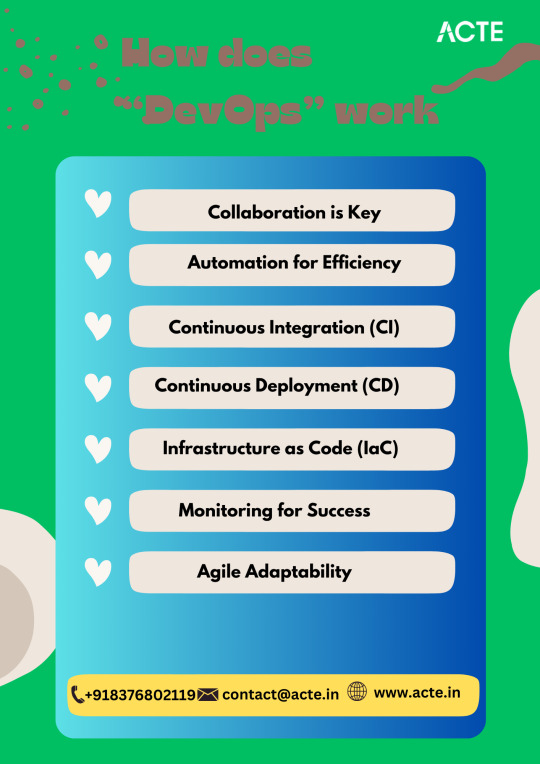
5. Infrastructure as Code (IaC)
DevOps treats infrastructure as code, managing servers, networks, and databases through code. This approach ensures consistency, scalability, and easy replication of environments.
Example: Treating your infrastructure as code is like having a recipe for your server setup—easy to replicate, consistent every time.
6. Monitoring for Success
DevOps emphasizes continuous monitoring of application performance. This ongoing feedback loop helps teams identify and address issues promptly, contributing to continuous improvement.
Example: Monitoring is like having a fitness tracker for your application. It alerts you when things are off, ensuring optimal health.
7. Agile Adaptability
Aligned with Agile principles, DevOps embraces change and flexibility in software development. The iterative nature of Agile methodologies ensures adaptability to evolving requirements.
Example: DevOps embraces change like a GPS recalculating your route. It ensures you reach your destination despite unexpected detours.
DevOps is a transformative approach that goes beyond tools and technologies, emphasizing collaboration, automation, and continuous improvement. By adopting DevOps principles and practices, organizations can enhance their ability to deliver high-quality software at a faster pace, ultimately meeting the demands of today's dynamic and competitive business landscape. As we continue to unveil the inner workings of DevOps, it becomes clear that it is not just a methodology; it's a culture that empowers teams to innovate and thrive in the ever-evolving world of technology.
0 notes
Text
Discover the synergy of DevOps & Machine Learning, reshaping operations worldwide. Explore the evolution at the intersection in this transformative journey.
#Automation in DevOps#ML Algorithms for DevOps#Machine Learning in Operations#DevOps Transformation with ML#ML-enhanced Efficiency#Integration of ML in DevOps#ML-Enabled DevOps Practices#DevOps Automation
0 notes
Text
https://websartech.com/devops
0 notes
Text
#DevOps#DevSecOps#SoftwareDevelopment#ApplicationSecurity#ContinuousIntegration#DevOpsVsDevSecOps#Cybersecurity#Automation#ShiftLeftSecurity#SecureDevelopment
0 notes
Text
Where Can I Find DevOps Training with Placement Near Me?
Introduction: Unlock Your Tech Career with DevOps Training
In today’s digital world, companies are moving faster than ever. Continuous delivery, automation, and rapid deployment have become the new norm. That’s where DevOps comes in a powerful blend of development and operations that fuels speed and reliability in software delivery.
Have you ever wondered how companies like Amazon, Netflix, or Facebook release features so quickly without downtime? The secret lies in DevOps an industry-demanded approach that integrates development and operations to streamline software delivery. Today, DevOps skills are not just desirable they’re essential. If you’re asking, “Where can I find DevOps training with placement near me?”, this guide will walk you through everything you need to know to find the right training and land the job you deserve.

Understanding DevOps: Why It Matters
DevOps is more than a buzzword it’s a cultural and technical shift that transforms how software teams build, test, and deploy applications. It focuses on collaboration, automation, continuous integration (CI), continuous delivery (CD), and feedback loops.
Professionals trained in DevOps can expect roles like:
DevOps Engineer
Site Reliability Engineer
Cloud Infrastructure Engineer
Release Manager
The growing reliance on cloud services and rapid deployment pipelines has placed DevOps engineers in high demand. A recent report by Global Knowledge ranks DevOps as one of the highest-paying tech roles in North America.
Why DevOps Training with Placement Is Crucial
Many learners begin with self-study or unstructured tutorials, but that only scratches the surface. A comprehensive DevOps training and placement program ensures:
Structured learning of core and advanced DevOps concepts
Hands-on experience with DevOps automation tools
Resume building, interview preparation, and career support
Real-world project exposure to simulate a professional environment
Direct pathways to job interviews and job offers
If you’re looking for DevOps training with placement “near me,” remember that “location” today is no longer just geographic—it’s also digital. The right DevOps online training can provide the accessibility and support you need, no matter your zip code.
Core Components of a DevOps Course Online
When choosing a DevOps course online, ensure it covers the following modules in-depth:
1. Introduction to DevOps Culture and Principles
Evolution of DevOps
Agile and Lean practices
Collaboration and communication strategies
2. Version Control with Git and GitHub
Branching and merging strategies
Pull requests and code reviews
Git workflows in real-world projects
3. Continuous Integration (CI) Tools
Jenkins setup and pipelines
GitHub Actions
Code quality checks and automated builds
4. Configuration Management
Tools like Ansible, Chef, or Puppet
Managing infrastructure as code (IaC)
Role-based access control
5. Containerization and Orchestration
Docker fundamentals
Kubernetes (K8s) clusters, deployments, and services
Helm charts and autoscaling strategies
6. Monitoring and Logging
Prometheus and Grafana
ELK Stack (Elasticsearch, Logstash, Kibana)
Incident alerting systems
7. Cloud Infrastructure and DevOps Automation Tools
AWS, Azure, or GCP fundamentals
Terraform for IaC
CI/CD pipelines integrated with cloud services
Real-World Applications: Why Hands-On Learning Matters
A key feature of any top-tier DevOps training online is its practical approach. Without hands-on labs or real projects, theory can only take you so far.
Here’s an example project structure:
Project: Deploying a Multi-Tier Application with Kubernetes
Such projects help learners not only understand tools but also simulate real DevOps scenarios, building confidence and clarity.
DevOps Training and Certification: What You Should Know
Certifications validate your knowledge and can significantly improve your job prospects. A solid DevOps training and certification program should prepare you for globally recognized exams like:
DevOps Foundation Certification
Certified Kubernetes Administrator (CKA)
AWS Certified DevOps Engineer
Docker Certified Associate
While certifications are valuable, employers prioritize candidates who demonstrate both theoretical knowledge and applied skills. This is why combining training with placement offers the best return on investment.
What to Look for in a DevOps Online Course
If you’re on the hunt for the best DevOps training online, here are key features to consider:
Structured Curriculum
It should cover everything from fundamentals to advanced automation practices.
Expert Trainers
Trainers should have real industry experience, not just academic knowledge.
Hands-On Projects
Project-based assessments help bridge the gap between theory and application.
Flexible Learning
A good DevOps online course offers recordings, live sessions, and self-paced materials.
Placement Support
Look for programs that offer:
Resume writing and LinkedIn profile optimization
Mock interviews with real-time feedback
Access to a network of hiring partners
Benefits of Enrolling in DevOps Bootcamp Online
A DevOps bootcamp online fast-tracks your learning process. These are intensive, short-duration programs designed for focused outcomes. Key benefits include:
Rapid skill acquisition
Industry-aligned curriculum
Peer collaboration and group projects
Career coaching and mock interviews
Job referrals and hiring events
Such bootcamps are ideal for professionals looking to upskill, switch careers, or secure a DevOps role without spending years in academia.
DevOps Automation Tools You Must Learn
Git & GitHub Git is the backbone of version control in DevOps, allowing teams to track changes, collaborate on code, and manage development history. GitHub enhances this by offering cloud-based repositories, pull requests, and code review tools—making it a must-know for every DevOps professional.
Jenkins Jenkins is the most popular open-source automation server used to build and manage continuous integration and continuous delivery (CI/CD) pipelines. It integrates with almost every DevOps tool and helps automate testing, deployment, and release cycles efficiently.
Docker Docker is a game-changer in DevOps. It enables you to containerize applications, ensuring consistency across environments. With Docker, developers can package software with all its dependencies, leading to faster development and more reliable deployments.
Kubernetes Once applications are containerized, Kubernetes helps manage and orchestrate them at scale. It automates deployment, scaling, and load balancing of containerized applications—making it essential for managing modern cloud-native infrastructures.
Ansible Ansible simplifies configuration management and infrastructure automation. Its agentless architecture and easy-to-write YAML playbooks allow you to automate repetitive tasks across servers and maintain consistency in deployments.
Terraform Terraform enables Infrastructure as Code (IaC), allowing teams to provision and manage cloud resources using simple, declarative code. It supports multi-cloud environments and ensures consistent infrastructure with minimal manual effort.
Prometheus & Grafana For monitoring and alerting, Prometheus collects metrics in real-time, while Grafana visualizes them beautifully. Together, they help track application performance and system health essential for proactive operations.
ELK Stack (Elasticsearch, Logstash, Kibana) The ELK stack is widely used for centralized logging. Elasticsearch stores logs, Logstash processes them, and Kibana provides powerful visualizations, helping teams troubleshoot issues quickly.
Mastering these tools gives you a competitive edge in the DevOps job market and empowers you to build reliable, scalable, and efficient software systems.
Job Market Outlook for DevOps Professionals
According to the U.S. Bureau of Labor Statistics, software development roles are expected to grow 25% by 2032—faster than most other industries. DevOps roles are a large part of this trend. Companies need professionals who can automate pipelines, manage scalable systems, and deliver software efficiently.
Average salaries in the U.S. for DevOps engineers range between $95,000 to $145,000, depending on experience, certifications, and location.
Companies across industries—from banking and healthcare to retail and tech—are hiring DevOps professionals for critical digital transformation roles.
Is DevOps for You?
If you relate to any of the following, a DevOps course online might be the perfect next step:
You're from an IT background looking to transition into automation roles
You enjoy scripting, problem-solving, and system management
You're a software developer interested in faster and reliable deployments
You're a system admin looking to expand into cloud and DevOps roles
You want a structured, placement-supported training program to start your career
How to Get Started with DevOps Training and Placement
Step 1: Enroll in a Comprehensive Program
Choose a program that covers both foundational and advanced concepts and includes real-time projects.
Step 2: Master the Tools
Practice using popular DevOps automation tools like Docker, Jenkins, and Kubernetes.
Step 3: Work on Live Projects
Gain experience working on CI/CD pipelines, cloud deployment, and infrastructure management.
Step 4: Prepare for Interviews
Use mock sessions, Q&A banks, and technical case studies to strengthen your readiness.
Step 5: Land the Job
Leverage placement services, interview support, and resume assistance to get hired.
Key Takeaways
DevOps training provides the automation and deployment skills demanded in modern software environments.
Placement support is crucial to transitioning from learning to earning.
Look for comprehensive online courses that offer hands-on experience and job assistance.
DevOps is not just a skill it’s a mindset of collaboration, speed, and innovation.
Ready to launch your DevOps career? Join H2K Infosys today for hands-on learning and job placement support. Start your transformation into a DevOps professional now.
#devops training#DevOps course#devops training online#devops online training#devops training and certification#devops certification training#devops training with placement#devops online courses#best devops training online#online DevOps course#advanced devops course#devops training and placement#devops course online#devops real time training#DevOps automation tools
0 notes
Text
Where Smart Tech Meets Real Impact
At Ezintsha Systems we don’t just create digital tools. We solve everyday problems with tech that makes sense. From smoother app experiences to reliable systems behind the scenes we focus on what actually helps people. We believe the future should feel simple useful and built for you.
Get in touch today and let's build something that works for real people.

#ezintsha systems#software development#app development#digitaltransformation#automation#softwaredevelopment#ai#devops#technology#innovation
0 notes
Text

How Has DevOps Evolved from Manual Tasks to Automated Pipelines?
Discover how DevOps has transformed from manual scripting to seamless automated pipelines in our detailed learning programs at AP2V Academy. As businesses embrace faster software delivery, understanding the DevOps automation value becomes essential. Our expert-led DevOps Engineer Course Online covers the full DevOps lifecycle, including a practical list of DevOps tools like Jenkins, Docker, Kubernetes, and more. Whether you're aiming to become an AWS DevOps Engineer or upgrade your current skill set, AP2V offers comprehensive AWS DevOps Engineer Training to help you master automation, CI/CD, and cloud deployment. Learn how modern DevOps practices are driving efficiency and innovation across industries. Enroll now and stay ahead in your IT career with AP2V Academy’s industry-ready DevOps training programs.
0 notes